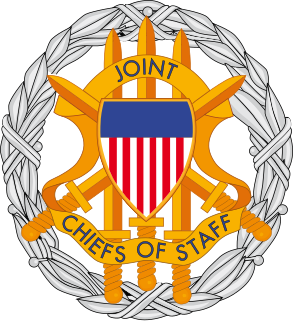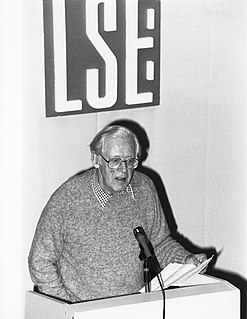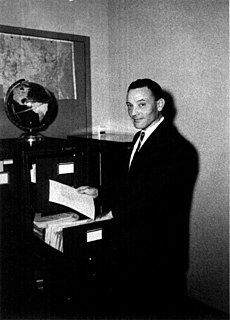Related Research Articles

Fort Snelling is a former military fortification and National Historic Landmark in the U.S. state of Minnesota on the bluffs overlooking the confluence of the Minnesota and Mississippi Rivers. The military site was initially named Fort Saint Anthony, but it was renamed Fort Snelling once its construction was completed in 1825.

The Joint Chiefs of Staff (JCS) is the body of the most senior uniformed leaders within the United States Department of Defense, that advises the president of the United States, the secretary of defense, the Homeland Security Council and the National Security Council on military matters. The composition of the Joint Chiefs of Staff is defined by statute and consists of a chairman (CJCS), a vice chairman (VJCS), the service chiefs of the Army, Marine Corps, Navy, Air Force, Space Force, and the chief of the National Guard Bureau. Each of the individual service chiefs, outside their JCS obligations, work directly under the secretaries of their respective military departments, e.g. the secretary of the Army, the secretary of the Navy, and the secretary of the Air Force.

Rodney Howard Hilton was an English Marxist historian of the late medieval period and the transition from feudalism to capitalism.

Lawrence Rush "Rick" Atkinson IV is an American author, most recently of The British Are Coming: The War for America, Lexington to Princeton, 1775–1777, the first volume in the Revolution Trilogy. He has won Pulitzer Prizes in history and journalism.

General Thomas Dresser White was the fourth Chief of Staff of the United States Air Force.
Sir Michael Eliot Howard was an English military historian, formerly Chichele Professor of the History of War, Honorary Fellow of All Souls College, Regius Professor of Modern History at the University of Oxford, Robert A. Lovett Professor of Military and Naval History at Yale University, and founder of the Department of War Studies, King's College London. In 1958, he co-founded the International Institute for Strategic Studies.

Richard Greening Hewlett was an American public historian best known for his work as the Chief Historian of the United States Atomic Energy Commission.

Robert M. Citino is an American military historian and the Samuel Zemurray Stone Senior Historian at the National WWII Museum. He is a leading authority on modern German military history, with an emphasis upon World War II and the German influence upon modern operational doctrine.
Edward "Ed" G. Lengel is an American author and military historian. He is the 2018 Revolutionary in Residence for Colonial Williamsburg. His previously published books focus on George Washington's life and legacy, and World War I.
The Forest History Society is an American non-profit organization dedicated to the preservation of forest and conservation history. The society was established in 1946 and incorporated in 1955.
Theodore Christian Blegen was an American historian and author. Blegen was the author of numerous historic reference books, papers and articles written over a five decade period. His primary areas of focus were of the history of the state of Minnesota and of Norwegian-American immigration.
Lewis Stone "Bob" Sorley III is an American intelligence analyst and military historian. His books about the U.S. war in Vietnam, in which he served as an officer, have been highly influential in government circles.

Ray Steiner Cline was an official at the United States Central Intelligence Agency and is best known for being the chief CIA analyst during the Cuban Missile Crisis.
Mary Christine Carpenter is an English historian who serves as professor of medieval English history at the University of Cambridge.
Irving Brinton Holley Jr. was an American historian. He was a leading scholar in the field of American social and intellectual history, and his particular emphasis was on military history and the history of technology.

Larry M. Wortzel served nine terms as a commissioner on the United States-China Economic and Security Review Commission of the United States Congress. A 32-year military veteran, he was a U.S. Army colonel, director of the Strategic Studies Institute of the United States Army War College, and vice president of The Heritage Foundation. He was a military attaché at the U.S. Embassy in Beijing, and witnessed the Tiananmen Massacre in 1989. He is considered one of the United States' top experts on China and its military strategy. He is Senior Fellow in Asian Security at the American Foreign Policy Council.
Geoffrey P. Megargee was an American historian and author who specialized in World War II military history and the history of the Holocaust. He served as the project director and editor-in-chief for the Encyclopedia of Camps and Ghettos, 1933–1945 produced by the United States Holocaust Memorial Museum. Megargee's work on the German High Command won the 2001 Distinguished Book Award from the Society for Military History.
Kenneth George Young FAcSS FRHistS was a British political scientist and historian who was Professor of Public Policy at King's College London in its Department of War Studies. Earlier he was instrumental in the creation of the Department of Political Economy at KCL in 2010, and was its founding Head of Department.
Robert Francis Byrnes was an American professor of history, specializing in Russian history and Kremlinology.

Richard Clark Lindsay was a lieutenant general in the United States Air Force (USAF). During World War II he served in the Air War Plans Division and the Operations Division of the War Department General Staff, and on the staff of the Joint Chiefs of Staff. He served on the staff of the U.S. Army Strategic Air Forces on Guam, the Pacific Air Command in Manila and the Far East Air Forces in Tokyo, and commanded the 316th Bombardment Wing on Okinawa. From 1957 to 1960 1957, he was the NATO commander of Allied Air Forces Southern Europe.
References
- ↑ Who's Who in the Midwest. The A. N. Marquis Company. 1949. p. 765.
- 1 2 3 4 "Rodney Loehr". Star Tribune. October 16, 2005. Retrieved August 2, 2020.
- ↑ "Founding Director Interviewed: Rodney C. Loehr Remembers FHS Beginnings" (PDF). The Cruiser. Forest History Society. Winter 1990. Retrieved October 19, 2020.
- ↑ "Rodney C. Loehr, FHS Executive Director, 1946-1950". Forest History Society. Retrieved August 2, 2020.
- ↑ "Rodney C. Loehr: An Inventory of His Papers at the Minnesota Historical Society". Minnesota Historical Society. Retrieved August 2, 2020.